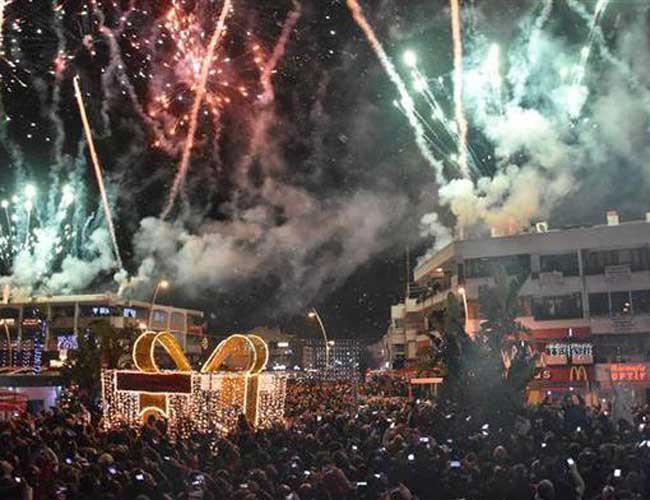New Year’s Eve celebrated across Turkey amid tight security
ISTANBUL

New Year’s Eve was celebrated across Turkey amid tight security measures, with several roads closed to vehicle traffic and bans on celebrations in popular districts.
Roads leading to Istanbul’s popular Taksim Square were closed to vehicles at 3 p.m. on Dec. 31, 2017 as part of the security precautions, while tourists and pedestrians were allowed to enter the square after passing through police checks.
In a first, gendarmerie units used anti-drones developed by Turkish defense contractor Aselsan in the square against possible attacks, which grabbed the attention of passersby.
Another first was the use of two native Central Anatolian sheep dogs - Kangal and Akbaş - with police patrolling the square and the avenue with the dogs. While it is common for police to use K9 dogs, native dogs, whose mouths were muzzled, were used by police as part of preventive measures for the first time.
Detector dogs were also on duty against possible bomb attacks.
The authorities monitored surveillance footage from 38 cameras placed around Taksim and İstiklal Avenue and notified security forces if they spotted any suspicious movement.
Seven fire trucks waited near the square, while riot police officers were present in the area with their armored vehicles.
Despite the strict measures, a number of sexual harassment incidents took place in Taksim and three people were detained.
In addition to Taksim, a number of roads in the Beşiktaş and Kadıköy districts were also closed from 3 p.m. and heavy vehicles were not allowed to enter several districts, starting from early hours of the day.
While İstiklal Avenue was packed with people celebrating the coming of the new year, there were also some people out on the streets to protest the festivities.
A group in Karaköy distributed leaflets headlined “New Year’s Eve and Muslims” to passersby, urging people not to celebrate the day for religious reasons. The group dispersed after distributing the leaflets and lecturing locals.
Despite being one of the most popular sites of New Year’s Eve celebrations in recent years, the upscale neighborhood of Nişantaşı was largely empty this year as a result of the strict security measures.
The tight precautions were adopted a year after an Islamic State of Iraq and the Levant (ISIL) attack on a nightclub that left 39 people dead and another 79 wounded. Anti-ISIL operations were stepped up last week, with police apprehending many jihadist suspects who had reportedly been planning to stage attacks on New Year’s Eve.
Strict security measures were also taken in the capital Ankara, where some police officers disguised themselves in Santa clothing in the Kızılay Square.
In the Central Anatolian provinces of Sivas and Konya, the religious conservative Anatolia Youth Association (AGD) staged events to mark the 1,387th anniversary of the conquest of Mecca.
“Muslims don’t celebrate New Year’s Eve,” chanted participants of a rally organized in Sivas by the AGD, which said its aim was to “change Sivas residents’ minds about celebrating the day.”
In the Central Anatolian province of Eskişehir, tension rose when two Iraqis opened their country’s flag during a street celebration attended by Iraqis and Syrians. Upon seeing the Iraqi flag, a group of Turks reportedly opened a Turkish flag, chanted slogans, and physically confronted the Iraqis.
“How happy is the one who calls himself a Turk!” was among the slogans chanted by locals, who also sung the Turkish national anthem.
Tension eased after police intervened to separate the two sides.
In the southern province of Antalya, meanwhile, a group of revelers celebrated the coming of the new year by swimming in the sea.
The group of nearly 20 people, including teachers, engineers and businesspeople, lit a fire in the Konyaaltı Beach to warm up and swam in the Mediterranean despite the cold winter weather.
A popular vacation site for Iranian tourists, the eastern province of Van hosted many Iranian revelers who welcomed the new year in nightclubs.
In the southeastern provinces of Gaziantep and Şanlıurfa, many locals reportedly “celebrated” 2018 by opening fire into the air, a traditional but much criticized method of celebration in parts of Turkey’s southeast. No casualties were reported as a result of the firings in Şanlıurfa’s Siverek district and Gaziantep’s İslahiye district.
















